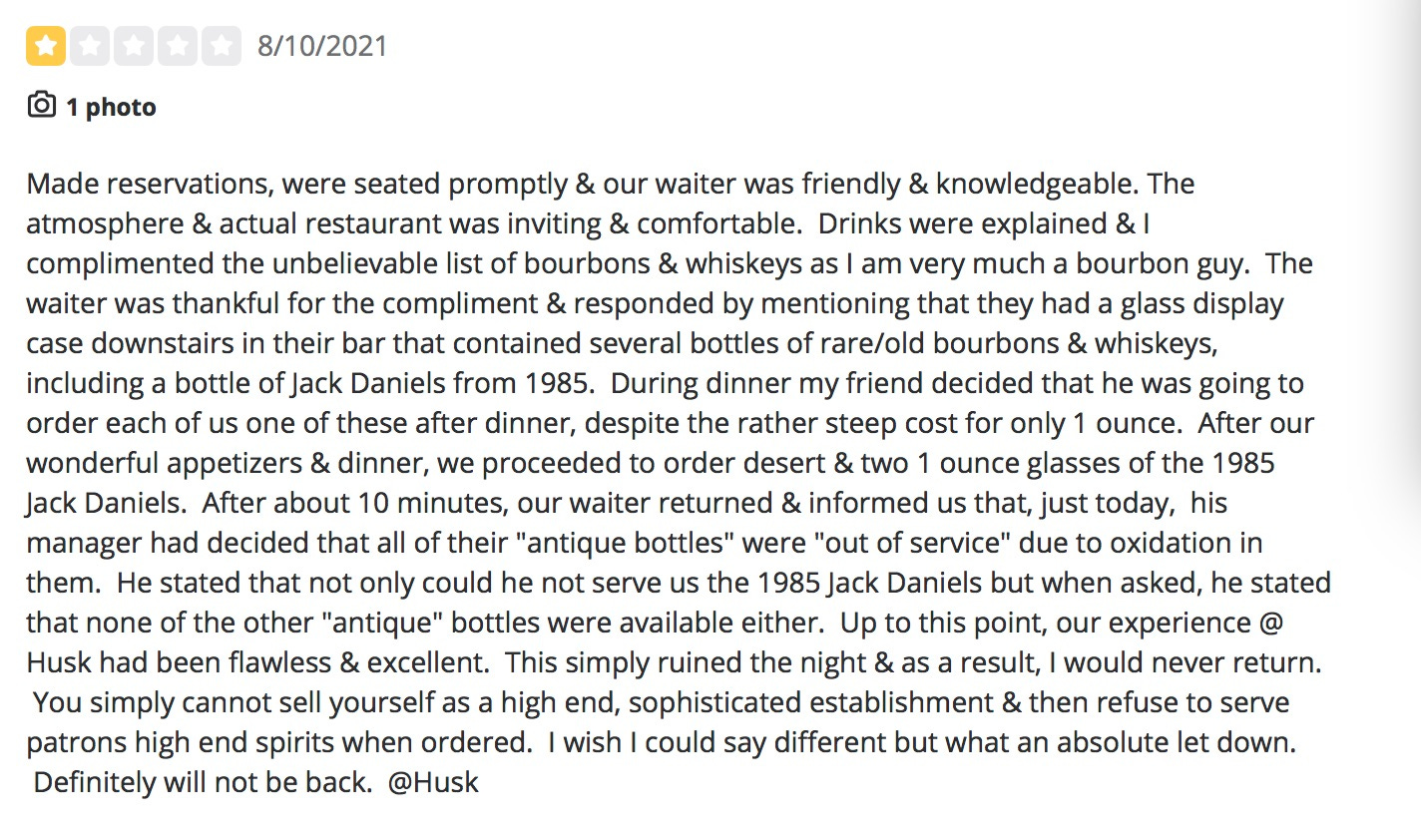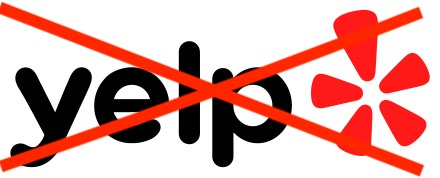Yelp Must Die!
A Malignant Economy of Lies.
I think we can all agree that social media has been a disaster for the human race. (Don’t forget to follow me on Twitter!) Likewise, I think we can agree that Yelp is perhaps the most disastrous of all crowd-sourced content sites, a shambling mess serving up opinions better left inside the heads of Yelpers.
It’s not that I don’t find Yelp useful, it’s that the price I pay in agitation for that usefulness is too high to tolerate. For every hidden-gem restaurant found on Yelp, I’m assaulted by twenty superfluously stupid opinions. As my late father was fond of saying, “people are idiots,” and Yelp proves his point, every single day.
A decade ago, for a brief moment, one of the funniest sites on the internet was a blog called F*** You Yelper, a place that collected the most fatuous, inane and asinine Yelp reviews and held them up for ridicule. But, like a leaf in the wind, F*** You Yelper disappeared, leaving us to stumble upon Yelp’s finest moments all on our own. And stumble we do, like unwary hikers falling down a hidden mineshaft.
For example, look at this one, left for Sean Brock’s very good and very busy Nashville restaurant Husk.
Of all sad words of tongue or pen, the saddest are these, “I just wanted to leave this review.”
Here’s another, longer one, again for Husk…

Did anyone else get the suspicion that “our bottles are out of service,” was a polite way of saying, “you’re too drunk to serve. Go home, Cletus.”
At the least, there are key details missing in this story, as there are in most of the stupidest one-star Yelp reviews. This lopsided subjectivity means that we never know what actually happened. It’s just one aggrieved person’s version of events, real or imagined. In other words, Yelp gives entirely too much rhetorical power to malcontents, morons, narcissists and sociopaths, to people whose opinions you would never solicit, nor willingly listen to. But, thanks to the destructive power of modern technology, those opinions are now thrust into your face anytime you’re looking for the opening hours of a restaurant you’ve never visited.
One of the saddest parts of reading Yelp is seeing that many restaurants now employee people whose job it is to respond obsequiously to these awful Yelp beings. “Dear Mr. Cletus, I’m sorry your experience at our restaurant was less than satisfactory…”
Let me make this clear: the customer is not always right!
Sometimes the customer is a turd who deserves to be shoveled out of the establishment and into the street. In such cases, it’s a minor tragedy that an honest business has to then be terrorized by Yelp, its reputation held hostage to the contrary whims of vindictive and petty people.
Unfortunately, the ignorant negative reviews are not the only problem. The positive reviews are almost as bad and frequently as ignorant. Often they are over-written, over-wrought and over-the-top. Manic energy and too many exclamation points radiate from the screen. They convey little useful information, but entirely too much malignant “personality”. Even without the profile photo, you can imagine the person behind the words as someone with his skin drawn tautly over his skull, eyes bulging, lips pulled back to reveal a rictus grin of forced good humor.
Yet, complaining about yelpers says nothing of the fact that, in half of America, the Red Lobster is Yelp’s highest-rated restaurant. Nor does it say anything about the fact that Yelp, like the Japanese Yakuza, has essentially been guilty of extorting money from restaurants. Those are just two of the many crimes of Yelp.
Ultimately, however, the biggest problem is that Yelp overly democratizes criticism. It take a minor art, restaurant criticism, and turns it into a free-for-all of worthless opinion. Instead of sipping a civilized cocktail, you’re drinking swill from a firehose.
Writing good criticism, even restaurant criticism, isn’t something anyone can do. Not many people can write well, and most who do, don’t have the critical sense or sufficient taste to be good at criticism. Worse, we live in a moment when intelligent criticism, as a skill, has collapsed across the board. Almost no one seems to know anything about music, books, art, architecture, or movies. The premium for knowledge is at an all-time low. The market for criticism has gone bankrupt, and sites like Yelp helped it get there by flooding the internet with cheap shite.
Yes, for all I know, there may be great critics on Yelp, writing brilliant reviews at this very moment, but I’ll never find them because the signal-to-noise ratio is so terrible. As far as I can see, the tag “Elite Yelper” should be a scarlet letter.
Sadly, restaurant criticism is virtually dead as an art form. It was never particularly robust, but it’s next to useless now. Yelp destroyed it. And we, in turn, must now destroy Yelp.
Yelp must die.
Take the app off your smart phone and shun the site. If you’re a restauranteur, do not pay Yelp for advertising, do not respond to negative reviews, and do not acknowledge Yelp’s existence. If we all ignore it, it will eventually go away, just like MySpace.
We must remove ourselves from the Yelp ecosystem, and remove Yelp from our ecosystem.
Yelp must die.
P.S. If you enjoyed this piece, check out some of my previous work.
A History of the Last Time I Ate at a Chinese Buffet: Gluttony and Regret
Pizza Isn’t Italian. It’s as American as Dixieland Jazz
Noodle Joints: Cheap, Delicious and a Moral Hazard. Asian food in turn-of-the-century America.






As a sometime professional restaurant critic I generally agree with anything that raises my status, and Yelp's sales and revenue model contains a fair share of sleaze. With that said, I'll mount a partial defense.
Even in a larger city that still has more than a fig leaf of local media, critics cover only a sliver of the new places, let alone keeping tabs on stuff that's been open since the Bush administration. We got a Zagat guide in the early aughts and it was a revelation, even at a time when we had two competing dailies and four competing alt weeklies all doing reviews. In some ways I think the Zagat system was the best mix of pro/amateur because it selected for enthusiasts rather than wannabe influencers or cranks with an ax to grind.
What any serious consumer knows is that Yelp is useful if you read it with a filter. I've joked that its quality would be dramatically increased if they allowed you to filter out reviews that included the phrases "large party," "brunch," or "Restaurant Week" from the results, because those in particular are flypaper for amateurs. I've sometimes second-guessed my own tendency to avoid places with less than 3.5 stars, and I've rarely been favorably surprised. I'm sure there are exceptions but in areas where there's a high density of reviews, 3 stars and below really does seem to be a significant demarcation line.
Likewise, it seems to me that a steadily-growing number of operators are learning to do more than just give every would-be 1-star takedown a tongue bath in response. I've traveled a lot and have eaten in plenty of bad restaurants, and had some bad experiences in very good restaurants (ask me about Singlethread), but if I was Yelping almost all of these would be two or three stars. Many, surely not all, one-star reviews are written by zero-star customers, and I fully support managers and chefs responding to that effect.
Yelp is democracy writ small.
These are all people who vote, they just happen to be explaining their votes on restaurants instead of explaining their votes on politicians. You find their critiques messy, illiterate and reprehensible. If people wrote about why they voted the way they do, you would find it no different.
Why complain about something pointed at restaurants that you celebrate when it is pointed (silently) at politicians and political issues?